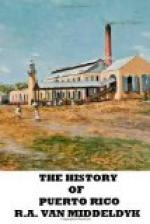In 1865 gambling was public and universal. In the capital there was a gambling-house in almost every street. One in the upper story of the house at the corner of San Francisco and Cruz Streets, kept by an Italian, was crowded day and night. The bank could be distinctly seen from the Plaza, and the noise, the oaths, the foul language, mixing with the chink of money distinctly heard. When the governor’s attention (General Felix Messina) was called to the scandalous exhibition, his answer was: “Let them gamble, ... while they are at it they will not occupy themselves with politics, and if they get ruined it is for the benefit of others.”
This systematic villification of the people completely neutralized the effect of the measures adopted from time to time by progressist governors, such as the Count of Mirasol, Norzagaray, Cotoner, and Pavia, and not even the revolution of September, 1868, materially affected the disgraceful condition of affairs in the island. Only those who paid twenty-five pesos direct contribution had the right of suffrage. The press remained subject to previous censorship, its principal function being to swing the incense-burner; the right of public reunion was unknown, and if known would have been impracticable; the majority of the respectable citizens lived under constant apprehension lest they should be secretly accused of disloyalty and prosecuted. Rumors of conspiracies, filibustering expeditions, clandestine introductions of arms, and attempts at insurrection were the order of the day. Every Liberal was sure to be inscribed on the lists of “suspects,” harassed and persecuted.
A seditious movement among the garrison on the 7th of June, 1867, gave Governor Marchessi a pretext for banishing about a dozen of the leading inhabitants of the capital, an arbitrary proceeding which was afterward disapproved by the Government in Madrid.
Such a situation naturally affected the economic conditions of the island. Confidence there was none. Credit was refused. Capital emigrated with its possessors. Commerce and agriculture languished. Misery spread over the land. The treasury was empty, for no contributions could be collected from an impoverished population, and the island’s future was compromised by loans at usurious rates.
The dethronement of Isabel II, and the revolution of September, 1868, brought a change for the better. The injustice done to the Antilles by the Cortes of 1873 was repaired, and the island was again called upon to elect representatives. The first meetings with that object were held in February, 1869.
The ideas and tendencies of the Liberal and Conservative parties among the native Puerto Ricans were now beginning to be defined. Each party had its organ in the press[56] and advocated its principles; the authorities stood aloof; the elections came off in an orderly manner (May, 1869); the Conservatives carried the first and third districts, the Liberals the second.




